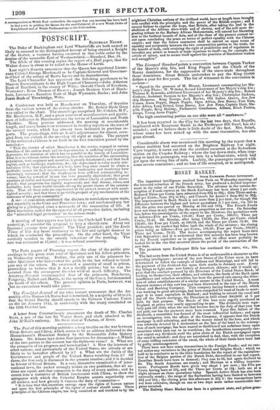A Conference was held at Manchester on Thursday, of deputies
from the various towns of the cotton district. Mr. Robert Hyde Greg was called to the chair. The assemblage comprised Mr. Cobden, M.P., Mr. Brotherton, M.P., and a great number of manufacturers and gentle- men of influence in Manchester and the towns of Lancashire and North Cheshire. Many persons addressed the meeting at considerable length, and many hours were consumed in reading reports on the state of the several towns, which has already been indicated in previous re- ports. The proceedings, with an hour's adjournment for dinner, occu- pied from ten o'clock in the morning till eight at night. The purport of the collected evidence is set forth in the first resolution passed by the meeting— "That the district of which Manchester is the centre, engaged in various branches of the cotton-trade and its dependencies, is suffering under a general depression, the duration of which has no parallel in the history of Lancashire. That it is in evidence before this meeting, that the condition of the surrounding population, both employer and operative, is greatly deteriorated; and that fixed capital, such as buildings, machinery, Sze., has depreciated in value nearly one- half since 1836; that capitalists, as a body, have long since ceased to obtain a profitable return for their investments ; that bankruptcy and insolvency have alarmingly increased ; that the shopkeepers have suffered corresponding re- verses; that the reward of labour has been generally diminished ; that great numbers of skilful and deserving workmen are either wholly or partially unem- ployed; that pauperism has rapidly augmented; and that disease, crime, and mortality, have made fearful inroads among the pourer classes of the commu- nity. That all these evils are experienced at the present moment with unmi- tigated severity ; and that there is no visible prospect of any amelioration of the distresses of this great community." A seer resomtion attributed the distress to restrictions upon trade, and especially to the Corn and Provision laws ; and condemned any law giving to a privileged class a monopoly of the necessiries of life. A third resolution called for the removal of all protective duties, including the "miscalled legal protection" to the cotton-trade.


























 Previous page
Previous page